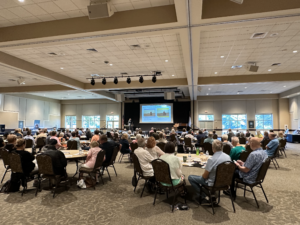 The 2024 Navigating the Parkinson’s Path was a resounding success, bringing together experts, sponsors, and the community to explore groundbreaking advancements in Parkinson’s disease treatment and management. On Saturday, August 10 the Peterson Foundation for Parkinson’s welcomed over 180 members of the Middle Tennessee Parkinson’s Community to network and gain insights into living with Parkinson’s.
The 2024 Navigating the Parkinson’s Path was a resounding success, bringing together experts, sponsors, and the community to explore groundbreaking advancements in Parkinson’s disease treatment and management. On Saturday, August 10 the Peterson Foundation for Parkinson’s welcomed over 180 members of the Middle Tennessee Parkinson’s Community to network and gain insights into living with Parkinson’s.
This event would not have been possible without the support of our many sponsors. We extend our heartfelt thanks to our presenting sponsor, Supernus, and to our other key sponsors: Acadia, Amneal Pharmaceuticals, Boston Scientific, Koyowa Kirin, Medtronic and Sorenson. A special thanks also goes to our community sponsors, Parkinson’s Foundation and Rock Steady Boxing, for their invaluable support.
Faye, Nutritionist: Dietary Strategies for Parkinson’s Management
Faye, a nutritionist who has lived with Parkinson’s for 14 years, shared valuable insights into how diet can complement medical therapy. She emphasized the importance of timing and composition of meals in relation to medication. For instance, consuming a low-protein snack one hour before medication can enhance its effectiveness by preventing competition with dietary proteins. Including vitamin C, such as lemon water, can also maximize medication absorption.
Faye’s personal experience with the MIND Diet underscored the significance of diet in managing Parkinson’s symptoms. She advised avoiding red meat, limiting daily sugar intake, and focusing on fresh vegetables and fruits. Regular physical activity, such as a 15-minute walk after meals, helps with food and medication absorption. Additionally, she recommended increasing vitamin B12 intake and avoiding artificial colorings and MSG.
Learn more about Faye by visiting her website at: https://glutenfreenutritionforlife.com/
Dr. Travis Hassell: Focused Ultrasound Therapy coming to Vanderbilt
Dr. Travis Hassell introduced an exciting new treatment option for tremors associated with Parkinson’s Disease and essential tremor: Focused Ultrasound Therapy. This innovative approach is now being offered at Vanderbilt University Medical Center with its first patient in August 2024. This method offers a non-invasive, incision-free procedure that uses MRI-guided focused ultrasound beams to create thermal lesions in targeted brain tissues. This method has demonstrated a significant 76.5% improvement in tremor severity over a three-year follow-up period.
The procedure, which is performed one side at a time, requires patients to remain awake to monitor their symptoms and make adjustments as needed. The technique is known for its precision, safety, and immediate results, with minimal invasive impact on cognitive functions. However, patients may experience temporary side effects such as headaches or tingling, which generally resolve within a few weeks. For those with bilateral symptoms, treatment is conducted on one side at a time, with the second side potentially treated after a nine-month interval.
Pros of Focused Ultrasound Therapy:
- Non-invasive
- Immediate results
- Minimal impact on cognitive functions
- Does not preclude future deep brain stimulation (DBS) treatments
Cons:
- Permanent scar
- Treatment is done one side at a time
- Potential for balance issues, mild speech slurring, or local numbness
- Higher side effects risk in patients with bilateral tremors
Ideal candidates include those with essential tremor or tremor-predominant Parkinson’s disease who prefer a less invasive, one-time treatment approach. For more information, visit Vanderbilt Health’s Advanced Movement Disorder Therapies.
Dr. Davis: Insights into Parkinson’s Disease Progression and Management
Dr. Davis provided a comprehensive overview of Parkinson’s disease, addressing common questions and concerns. He discussed the typical progression of the disease, noting that while initial responses to medication are usually stable for the first five years, motor fluctuations and balance issues often arise as the disease progresses. The average life expectancy for individuals with Parkinson’s is around 81 years, with the disease potentially reducing life expectancy by 1-2 years.
Dr. Davis emphasized that, despite extensive research, no medication currently approved globally has been shown to slow Parkinson’s progression definitively. However, regular exercise, managing co-morbidities, and adhering to a well-balanced diet can help manage symptoms and improve quality of life. He also highlighted the Hoehn and Yahr stages of Parkinson’s and the different types of Parkinson’s, including early onset, tremor-predominant, and atypical forms.
Conclusion
The 2024 EXPO highlighted significant advancements and practical advice for managing Parkinson’s Disease. With groundbreaking treatments like Focused Ultrasound Therapy and expert insights into disease progression and dietary management, attendees were left with a wealth of knowledge and hope. Thank you to all our sponsors, speakers, and attendees for making this event a success. We look forward to continued progress and innovation in the fight against Parkinson’s disease.
For more information on the latest treatments and management strategies, visit petersonforparkinsons.org and follow us on Facebook at PetersonforParkinsons.
